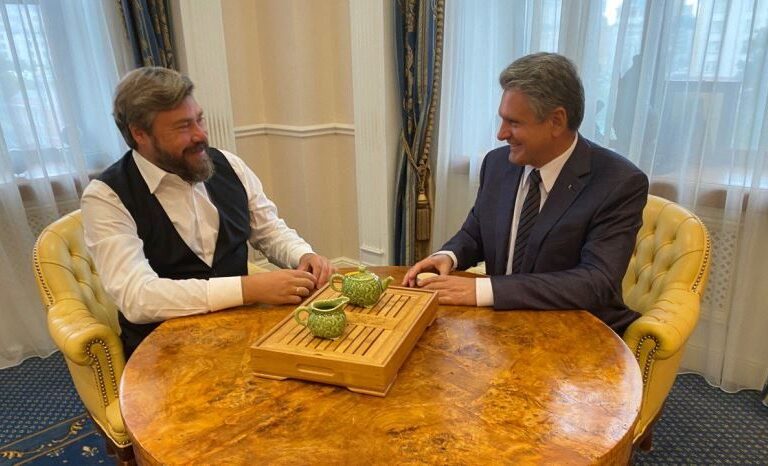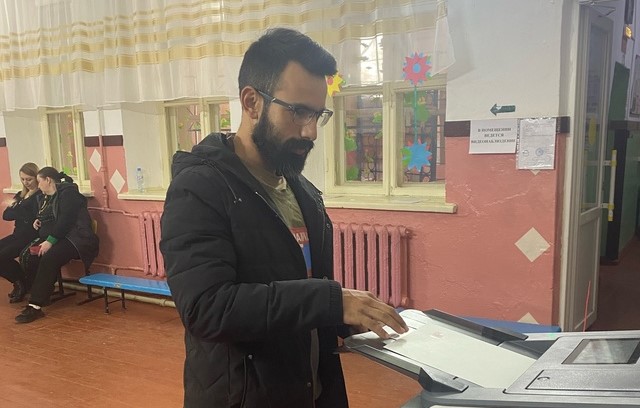President of Ukraine Volodimir Zelensky opened this event and emphasized: “What is the main goal of the Crimean Platform? To prepare for the de-occupation… Crimea will be de-occupied, just like all the other parts of Ukraine that are currently, unfortunately, under occupation… Ukraine does not trade territories, because Ukraine does not trade people. And everyone who is here, who participates in the Crimean Platform, who supported the peace formula, who aims for the completion of russian criminal and unprovoked aggression, you all declare that human life is the most valuable”.
Zelensky also emphasized: “Today we will sign a memorandum with a dozen, maybe even more, serious leading companies that want to come and economically develop Crimea right after de-occupation. These are strong brands of international hotel chains, airlines, banking businesses, technological and telecommunications companies, industrial companies, energy companies. As part of Ukrainian economy, Crimea will become part of the global economy… Thousands of Ukrainian and European global companies will come to Crimea. Already, companies like Ryanair and Royal Haskoning have expressed their willingness to invest. The restoration of Crimea is supported by the International Association of Hotels and Tourism Organizations. SkyUp, JoinUp, Vodafone, Luxoft, Genesis, Sigma Software, SoftServe, OKKO, lifecell, Ribas Group, Nokia, Epam, Fozzy Group”.
Summing up his speech, the President emphasized that the de-occupation of Crimea is a challenging path, “but we see this path”. Russian activities in Crimea have led to the catastrophic destruction of ecosystems on the peninsula and in the surrounding waters. Instead of terrorist bases, national parks and reserves are needed in Crimea. Instead of weapon depots for aggression, international cruise liners are needed. Instead of fortified palaces of military criminals and corrupt officials, modern new public spaces, modern technological companies, a new modern university are needed in Crimea. Only Ukraine is capable of bringing modernity back to Crimea.”
The moderator of the first discussion within the framework of the Crimean Platform was the Minister of Foreign Affairs of Ukraine, Dmytro Kuleba, who emphasized: “It is an honor for me to welcome new participants at this Third Summit: Bahrain, Serbia, East Timor, United Arab Emirates, Danube Commission, UNESCO, and the World Tourism Organization. Our common goal remains unchanged – to create conditions for the liberation of Crimea from occupation, as well as all temporarily occupied territories of Ukraine”.
The Minister of Foreign Affairs of Ukraine commented on Putin’s strategy aimed at avoiding the discussion of the Crimean issue and effectively imposing his status quo on the global community. The minister also emphasized that events taking place in occupied Crimea are crimes that must and ultimately will be punished: “A crime remains a crime, regardless of the passage of time. The crime must be punished, order must be restored. Crimea must be returned to Ukraine”.
The Chairman of the Verkhovna Rada of Ukraine, Ruslan Stefanchuk, noted: “…I am grateful that the initiative of the Verkhovna Rada of Ukraine has found support among the heads of parliaments of foreign states… I also want to inform you that today we had the Crimean Day in the Ukrainian parliament. We managed to vote on many statements and laws aimed at supporting the Crimean Platform, aimed at legislative support for the initiatives we are discussing today…”
The Chairman of the Verkhovna Rada pointed out that the components of a secure architecture include the restoration of territorial integrity, holding the military-political leadership accountable, the inadmissibility of blackmail in energy and nuclear security, the transformation of a secure environment, and Ukrainian NATO membership. “The aggressor only understands the language of strength and complete international isolation,” Ruslan Stefanchuk added.
In conclusion, the head of the Verkhovna Rada of Ukraine emphasized: “Dear friends, I have a great dream – that the next, fourth summit of the Crimean Platform will be held under this Ukrainian flag in free Crimea. I believe that this dream is within the reach of all of us, because only together can we make it come true”.
Prime Minister of Ukraine Denis Shmyhal, in his speech at the Crimean Platform Summit, presented a comprehensive plan for the economic and post-war recovery of Crimea. He emphasized the critical necessity of liberating Crimea and all Ukrainian territories currently under russian occupation to ensure a peaceful and secure future for future generations. “russia will pay for the restoration of Ukraine and the restoration of Ukrainian Crimea,” he stated during the third Crimean Platform Summit.
The Prime Minister of Ukraine added, “As long as Crimea is occupied, it is impossible to talk about justice, lasting peace, security in Europe, and an international order based on rules. But our flag will once again rise over Ukrainian Simferopol, Sevastopol, Yalta, and other cities of the Ukrainian peninsula. Crimea will become part of a great, strong, and European Ukraine”.
Alexander Kubrakov, the Minister of Community Development, Territories, and Infrastructure of Ukraine, said, “Crimea is isolated from the world, russian-speaking, polluted, and militarized space. There is no private business or capital in Crimea. All infrastructure is nationalized and turned into military objects. The tourism sector is being destroyed. The industrial sector operates to the detriment of unique ecosystems. The sabotage of the Kakhovka Hydroelectric Power Station by russian terrorists has left Crimea without water and the ability to develop the agricultural sector for many years”.
According to the minister, after de-occupation, Ukraine plans to restore and develop Crimea within the framework of a unified state regional policy. Alexander Kubrakov also emphasized that Ukraine will actively develop the tourism sector of the peninsula. Crimea will become a year-round resort with quality infrastructure and a focus on comfortable guest service.
Oleksandr Borniakov, the Deputy Minister for Development of IT at the Ministry of Digital Transformation of Ukraine, spoke about how a free Crimea could become a new “Silicon Valley”. “It is impossible to imagine Crimea without education, which is the foundation for the development of the IT sector. By creating special conditions to attract teachers and students, there should be a place like Berkeley or Stanford here. In fact, world technological universities will be invited to launch their own educational programs in Crimea”.
Tamila Tasheva, the Permanent Representative of the President of Ukraine in the Autonomous Republic of Crimea, emphasized the role of the peninsula in the formation of the Crimean Tatar people, calling Crimea the “central element of Crimean Tatar identity”. The Permanent Representative also noted: “During the time of occupation, Russian occupation administrations destroyed strong economic ties, formed their own judicial and law enforcement system, introduced Russian standards in education and social protection, and under various pretexts took away private property and land from Ukrainian citizens”.
Tasheva pointed out that one of the current priority areas of activity of the Representation of the President of Ukraine in the Autonomous Republic of Crimea is the training of professionals who will contribute to the restoration of the peninsula. “We need everyone who loves and understands Crimea and is ready to work on its reintegration”.







